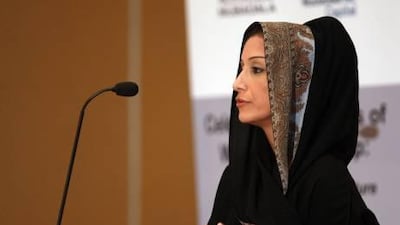ABU DHABI // More needs to be done to encourage young women to become successful leaders, officials said yesterday at a forum to mark International Women's Day.
Three times as many women as men pursue higher education in the UAE but less than 10 per cent hold top positions in the workforce - even though they make up about 60 per cent of the public sector, attendees heard.
Studies show that when women reach their 30s or 40s, they tend to plateau in their careers or drop out of the workforce, while men continue climbing the corporate ladder.
"We need a plan, a loud voice to emphasise this," said Fatima al Jaber, the chief operating officer at Al Jaber Group and chairwoman of the Abu Dhabi Business Women Council.
"Most university graduates are women and this means we have a big supply," she said. "But when these women go to the workforce the numbers go down, let's say by half. Through the years the numbers continue to [decrease] and by the time these women reach managerial positions it's a very small percentage."
The overall strategy of the country aimed to involve women across different sectors, but there was no solid platform that aims to place women in higher positions, Ms al Jaber added.
However, officials gathered at the Beach Rotana event - celebrating 100 Years of Women's Leadership - argued there had been progress over the years in supporting women.
Najla al Awadhi, a former FNC member, highlighted these achievements and said almost all Arab countries had granted women the right to vote and to hold public office, along with major advancements in education and health care.
The percentage of women in Arab parliaments also increased from 3.5 per cent in 2000 to 9.6 per cent in 2008. That figure is the lowest in the world, and significantly lower than the world average of 17.8 per cent.
"While our region is ranked very low in the gender gap scale, it does not mean we don't have achievements and it does not mean that our governments haven't taken action to address the issue," Ms al Awadhi said. "But when I'm asked, has enough been done? I answer absolutely not. I always say that this is a work in progress."
The Arab Human Development Report identifies gender inequality as the most prominent obstacle to human development in the Arab region, and says the lack of education and gender discrimination combine to keep the percentage of employed Arab women at only one-third - also the lowest in the world. "While we are here to celebrate the achievements, I think we do a great injustice to future generations, and to ourselves, if we're not honest about the challenges that are very much a reality for women in our societies," Ms al Awadhi said.
Solutions are within sight, however. Among them are developing sustainable work environments that allow women to maintain and progress in their careers as they get older.
Ms al Awadhi also strongly suggested a "meritocratic quota system" that would require institutions to hire a certain number of women based on merit, and establishing a Ministry of Women and Family that would focus on advancing the role of women and policies that would support them.
Many solutions, speakers emphasised, could also be self-generated regardless of status - whether it was giving back to the community, joining NGOs, serving as role-models or even running for office.
Sultan al Qassemi, who has written for The National, spoke on using the powerful tool of social media to bring about change.
"The Arab world had about 23 million Facebook users in 2010," he said.
"By the end of the year the number is expected to almost double. Twitter users have also grown by 240 per cent. Whether it's used for business or social communication, social media is an incredibly powerful tool."
The most important solution to increasing the number of female leaders, however, lies at home, Ms al Awadhi said.
"The major barrier women will face is the societal mindset about the natural gender roles of men and women," she said. "This is the glass ceiling that is most difficult to break, because it is a glass ceiling of the mind.
"If you're a mother or you have a younger [sibling], take the time to make them understand these issues of gender and instil in them critical thinking, confidence, innovation and ethics. To have equally strong and confident sons and daughters only means we will have a stronger and more productive society."

